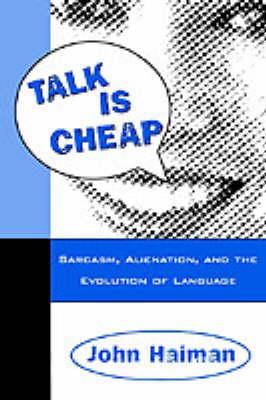Overview
Putting aside questions of truth and falsehood, the old ""talk is cheap"" maxim carries as much weight as ever. Indeed, perhaps more. For one need not be an expert in irony or sarcasm to realize that people don't necessarily mean what they say. Phrases such as ""Yeah, right"" and ""I couldn't care less"" are so much a part of the way we speak--and the way we live--that we are more likely to notice when they are absent (for example, Forrest Gump). From our everyday dialogues and conversations (""Thanks a lot!"") to the screenplays of our popular films (Pulp Fiction and Fargo), what is said is frequently very different from what is meant.Talk is Cheap begins with this telling observation and proceeds to argue that such ""unplain speaking"" is fundamentally embedded in the way we now talk. Author John Haiman traces this sea-change in our use of language to the emergence of a postmodern ""divided self"" who is hyper-conscious that what he or she is saying has been said before; ""cheap talk"" thus allows us to distance ourselves from a social role with which we are uncomfortable. Haiman goes on to examine the full range of these pervasive distancing mechanisms, from clichés and quotation marks to camp and parody. Also, and importantly, this text highlights several new ways in which the English language is evolving (and has evolved) in response to our postmodern world view. In other words, this study shows us how what we are saying is gradually separating itself from how we say it.As provocative as it is timely, the book will be fascinating reading for students of linguistics, literature, communication, anthropology, philosophy, and popular culture.
Full Product Details
Author: John Haiman (Professor of Linguistics, Professor of Linguistics, Macalester College, Minnesota)
Publisher: Oxford University Press Inc
Imprint: Oxford University Press Inc
Dimensions:
Width: 23.30cm
, Height: 1.90cm
, Length: 15.50cm
Weight: 0.363kg
ISBN: 9780195115253
ISBN 10: 0195115252
Pages: 232
Publication Date: 22 February 2001
Audience:
Professional and scholarly
,
Professional & Vocational
Format: Paperback
Publisher's Status: Active
Availability: To order

Stock availability from the supplier is unknown. We will order it for you and ship this item to you once it is received by us.
Reviews
Extremely appealing in its style and its use of examples from the daily life of American culture, but...also enriched by comparisons with other languages and cultures. While the style makes the ideas accessible to a wide audience, the scholarship runs broad and deep; [this book] is firmly based on the classics of linguistics, anthropology, philosophy, and sociology....It made me think about a lot of old things, and a lot of everyday things, in a new way. -Joan Bybee, Department of Linguistics, University of New Mexico Haiman's book represents the very best kind of work [being done] in cultural studies today. It constitutes a provocative-and refreshingly unpretentious-inquiry into human behavior (mainly linguistic but also non-linguistic)....A conceptually coherent whole that is nothing less than brilliant. Not to mention a terrifically good read. The book is dazzling in terms of the range of scholarship and documentation it draws on....It is altogether original in what it proposes and how it goes about its performance. -Suzanne Fleischman, French Department, University of California at Berkeley Haiman's ideas on the nature of plain (sincere) and unplain language (including sarcasm, politeness, euphemism, affectation) and the types and causes of unplain language are fascinating and should interest advanced students, faculty, and professionals. -Choice Haiman's examples and proofs, both cultural and linguistic, will amuse, instruct, and give the reader pause for thought. -Notes on Linguistics ...Haiman's provides a much-needed corrective to presentist arguments about the uniqueness of contemporary Western modes of thought and action. -Language in Society
Haiman's ideas on the nature of plain (sincere) and unplain language (including sarcasm, politeness, euphemism, affectation) and the types and causes of unplain language are fascinating and should interest advanced students, faculty, and professionals. --Choice<br> Haiman's book represents the very best kind of work [being done] in cultural studies today. It constitutes a provocative--and refreshingly unpretentious--inquiry into human behavior (mainly linguistic but also non-linguistic)....A conceptually coherent whole that is nothing less than brilliant. Not to mention a terrifically good read. The book is dazzling in terms of the range of scholarship and documentation it draws on....It is altogether original in what it proposes and how it goes about its performance. --Suzanne Fleischman, French Department, University of California at Berkeley<br> Extremely appealing in its style and its use of examples from the daily life of American culture, but...also enriched by comparisons with other languages and cultures. While the style makes the ideas accessible to a wide audience, the scholarship runs broad and deep; [this book] is firmly based on the classics of linguistics, anthropology, philosophy, and sociology....It made me think about a lot of old things, and a lot of everyday things, in a new way. --Joan Bybee, Department of Linguistics, University of New Mexico<br>
Author Information
John Haiman is a Professor of Linguistics at Macalester College in St. Paul, Minnesota. He has written several books about language, including The Rhaeto-Romance Languages (co-author, 1992) and Natural Syntax (1985).




